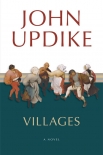Villages, John Updike [brene brown rising strong .TXT] 📗

- Author: John Updike
Book online «Villages, John Updike [brene brown rising strong .TXT] 📗». Author John Updike
From this same side of the house, beyond the lot, early on another morning, Owen heard the sound of a shot. He had been sleeping. He seemed to awake in the moment before hearing, as if in a dream, the noise that had awoken him. He had seen enough gangster movies to know the sound of gunpowder under percussion, but in the movies it came in machinegun waves, whereas this was a single, lonely sound.
His parents heard it, too, for they stirred in their bedroom, beyond his closed door, and the two voices, male and female, intertwined and then fell silent again. It was not quite dark outside; the trees in the side yard had silhouettes, their masses welling into that wash of gray light, with a faint tan tinge to the sky, before birds began to twitter. The street was silent, devoid of traffic, even a farm wagon. Later, he heard a siren, and later still the news, reported at breakfast by his father, who had been up the street news-gathering, that a young man in the Hoffmans’ household, two doors up from the house next to the vacant lot, had shot himself, with a service revolver, a Colt .38, that Wes Hoffman had kept from his time in the Great War. Danny Hoffman was not yet twenty, but a child under his supervision at a summer camp had dived into shallow water and broken his neck, and his responsibility had haunted him, though it had happened a summer ago. Danny had never been the same; he had stayed in the house listening to the radio serials and had stopped looking for a job.
That explained that. In a dozen years of Depression and World War II, from 1933 to 1945, it was the most dramatic event in Owen’s neighborhood. The woman across the street, Mrs. Yost, had a five-star flag in her front window, but all five soldier-sons came back in fine fettle. Skip Potteiger got Mary Lou Brumbach next door pregnant when she was only seventeen but then he married her so it was all right—by D-Day the baby was in a carriage that Mary Lou pushed back and forth on her way to the Acme, over the shallow troughs that carried roof water out to the gutter and the sidewalk squares that the roots of the horse-chestnut trees were tilting up, tripping you if you were on roller skates. On hot summer evenings the sounds of family quarrels would come across the street from the screened windows of the crowded row houses on the other side, the high side, up cement steps in the retaining walls that leaned outward precariously. But there were no divorces, as Owen remembered things. Voices were raised and shouts and door-slams cut through the neighborhood, but divorces happened elsewhere, in Hollywood and New York, and were tragic scandals, producing what nobody and certainly no child wanted: a broken home. The very phrase had a sinful, terrible sound and the ashen taste of disaster, like the bombed and smoking houses that filled the Fox Movietone newsreels at the Scheherazade, the local movie theatre. The world was full of destruction and evil, and only the United States, it seemed, could put it right. The country was at war, and in Owen’s fantasy the vacant lot in view of his bedroom was a bomb crater, overgrown with weeds.
The original willow tree still lived, coddled like an old dignitary with injections of pesticide and fertilizer thrust into its roots by making holes with a crowbar; it survived from the time when there had been a paper mill with a water wheel, and a pond stocked with trout, and a dirt racetrack, with harness races, before a grid of streets was laid out on the level low land north of the Pike. Owen’s house—not his house, really, and not even his parents’; it belonged to his mother’s parents, Isaac and Anna Rausch—was one of the older and bigger along Mifflin Avenue, bought by his grandfather when he felt rich from growing leaf tobacco in the First World War. He sold his farm and moved ten miles to this newly fashionable borough of Willow. Then, with the Depression, his savings melted away and his daughter and her husband and child moved in. One couple had a house, the other had some earning ability. Owen’s father was an accountant for one of the knitting mills in Alton. Owen’s auburn-haired, then-slender mother sold draperies in an Alton department store until her little boy pricked her conscience





Comments (0)